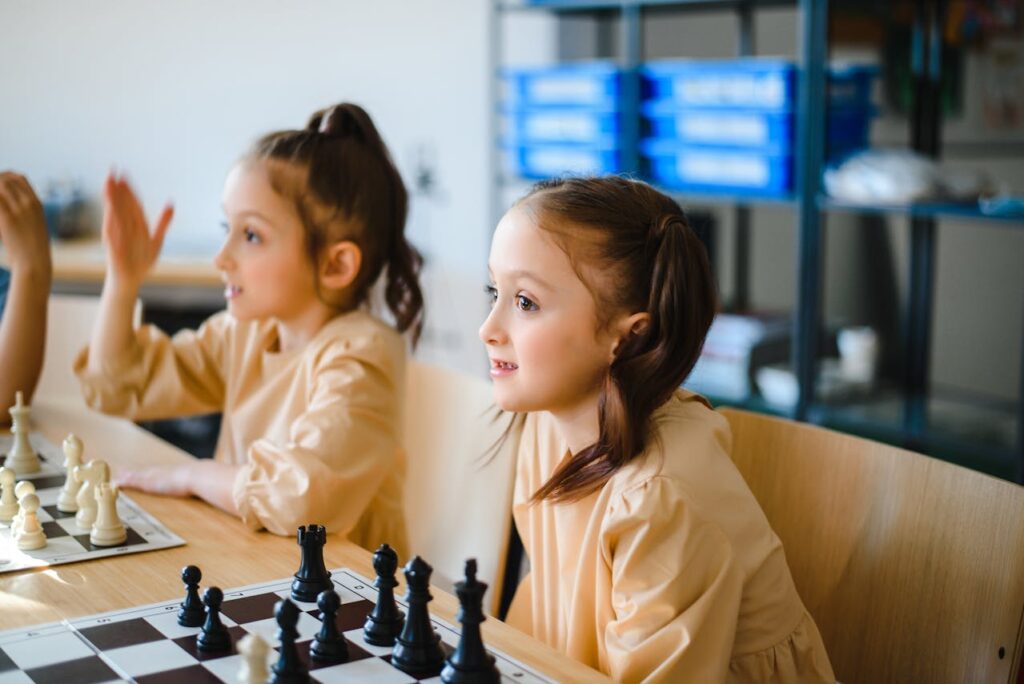In today’s fast-paced world, where digital interactions often replace face-to-face communication, helping children develop strong social skills is more important than ever. Social skills are the foundation for building healthy relationships, succeeding in school, and navigating the complexities of life. One surprising but highly effective way to develop these skills is through the game of chess.
Building Communication Skills Through Chess
Chess, despite being a game of strategy and intellect, is deeply rooted in communication. Whether played face-to-face or online, the game encourages interaction between players in various ways.
Engaging in Thoughtful Dialogue
One of the primary ways chess fosters communication is through the discussions that take place before, during, and after a game.
Before a match begins, players often engage in friendly conversation, setting the tone for respectful competition.
This pre-game dialogue helps children practice initiating conversations, a skill that’s critical for making friends and building social connections.
During the game, while direct communication might be limited, players are still engaged in a form of silent dialogue through their moves.
Each move conveys intent and strategy, creating a non-verbal exchange that requires players to pay close attention to their opponent’s actions.
This type of engagement teaches children to “listen” and “respond” thoughtfully, even without words, fostering a deeper level of understanding and connection with others.
Learning Respectful Disagreement
Chess naturally leads to situations where players have different ideas and approaches to the game. This setting provides a safe environment for children to learn how to disagree respectfully.
In chess, it’s normal for players to have differing opinions on strategy or how a game was played, and these differences often spark discussions that can be both educational and respectful.
When children discuss their games, they practice expressing their opinions and defending their ideas, all while maintaining respect for their opponent’s perspective.

This is an essential social skill, as respectful disagreement is a cornerstone of effective communication and conflict resolution.
By learning to handle disagreements calmly and respectfully in chess, children are better equipped to manage conflicts in other areas of their lives.
Enhancing Vocabulary and Expression
Chess has its own unique vocabulary, with terms like “checkmate,” “stalemate,” “gambit,” and “endgame” becoming part of the regular conversation between players.
Learning these terms and using them correctly helps children expand their vocabulary and improve their ability to express complex ideas clearly.
As children become more familiar with chess terminology, they also learn to use precise language to describe their strategies and moves.
This practice in using specific, clear language enhances their overall communication skills, making them more articulate in both spoken and written communication.
Developing Empathy and Emotional Intelligence
Empathy—the ability to understand and share the feelings of others—is a crucial social skill that chess helps develop in children.
Through the process of playing and interacting with opponents, children learn to see things from another person’s perspective, manage their own emotions, and respond to others in a caring and understanding way.
Understanding the Opponent’s Perspective
One of the most important aspects of chess is trying to anticipate the opponent’s moves and strategies.
To do this effectively, players must put themselves in their opponent’s shoes, thinking about the game from their perspective.
This mental exercise in seeing the world through someone else’s eyes is a foundational element of empathy.
For children, learning to think like their opponent helps them develop a deeper understanding of others’ thoughts and feelings.
This ability to consider another person’s perspective is essential in building empathy, as it teaches children to be more aware of how their actions and words might affect others.
Managing Emotions in Victory and Defeat
Chess is a game of highs and lows, with every match bringing the possibility of either victory or defeat.
These experiences are powerful lessons in emotional intelligence, particularly in how to handle success and failure with grace.
When children win a game, they learn the importance of humility and kindness in victory.
Instead of boasting, they are encouraged to recognize their opponent’s efforts and acknowledge that both players contributed to the game.
This approach fosters a sense of respect and empathy for others, even in moments of personal success.
On the other hand, losing a game teaches children how to manage disappointment and frustration.
Encouraging Fair Play and Respect
Chess is governed by a set of rules that all players must follow. Adhering to these rules teaches children the importance of fair play, honesty, and respect for their opponents.
These values are integral to building strong social skills and positive relationships.
In chess, cheating or breaking the rules not only diminishes the integrity of the game but also harms the trust between players.
By learning to play fairly and respect the rules, children internalize the importance of honesty and integrity, both in the game and in their interactions with others.
Building Confidence and Self-Esteem Through Chess
Confidence and self-esteem are crucial components of social skills. Children who feel good about themselves are more likely to engage with others, take on challenges, and express their ideas.
Chess is an excellent tool for building these qualities, as it offers children numerous opportunities to experience success, overcome challenges, and learn from their experiences.
Achieving Success Through Effort
One of the most rewarding aspects of chess is the sense of accomplishment that comes from winning a game or mastering a new strategy.
Unlike games of chance, success in chess is directly tied to a player’s effort, practice, and strategic thinking.
When children win a game or solve a difficult chess puzzle, they gain a sense of achievement that boosts their confidence.
This success is particularly powerful because it’s earned through effort. Children learn that hard work and perseverance lead to improvement and results.
This lesson in the value of effort is important not only for their confidence but also for their overall approach to challenges in life.
As they see their skills improve over time, their belief in their own abilities grows, making them more willing to take on new challenges both on and off the chessboard.
Overcoming Challenges and Building Resilience
Chess is a challenging game, and every player, regardless of their skill level, will encounter difficult situations.
Whether it’s facing a tough opponent, recovering from a mistake, or navigating a complex position on the board, chess constantly presents players with challenges to overcome.
For children, learning to navigate these challenges builds resilience.
They discover that even when the game isn’t going their way, they can still fight back, find creative solutions, and sometimes turn the situation around.
This resilience is crucial for building confidence, as it teaches children that they can handle difficulties and bounce back from setbacks.
Over time, as children overcome more challenges in chess, their self-esteem grows. They develop a sense of inner strength, knowing that they can face obstacles with determination and resourcefulness.
Learning to Take Risks in a Safe Environment
Chess encourages children to take calculated risks. Whether it’s sacrificing a piece for a better position or trying out a new strategy, chess rewards thoughtful risk-taking.
For many children, this experience of taking risks and seeing them pay off is incredibly empowering.
In chess, taking risks is part of the game, and it’s done in a safe environment where the consequences are limited to the game itself.
This safe space allows children to experiment with different strategies and ideas without fear of serious repercussions.
As they learn to take risks in chess, they become more comfortable with taking risks in other areas of life, such as participating in class, trying out for a sports team, or speaking up in social situations.
Teaching Sportsmanship and Respect Through Chess
Sportsmanship is a vital social skill that involves treating others with respect, whether you win or lose. Chess, with its clear rules and structured competition, is an ideal way to teach children the values of fair play, humility, and respect for others.
Handling Winning and Losing with Grace
In every chess game, there is a winner and a loser, and how children handle these outcomes teaches them important lessons in sportsmanship.
Winning a game can be exciting, but it’s important for children to learn to celebrate their success without belittling their opponent.
Chess teaches them to win graciously, acknowledging their opponent’s efforts and recognizing that victory is not just about their own skills but also about the challenges their opponent presented.
On the flip side, losing a game can be disappointing, but chess helps children learn to accept defeat with dignity.
Instead of becoming upset or blaming others, they are encouraged to reflect on the game, learn from their mistakes, and congratulate their opponent.
This ability to lose gracefully is a key aspect of sportsmanship and helps children build resilience and emotional maturity.
Building Respect for Opponents
Chess naturally fosters respect between players. The game is built on a foundation of mutual respect, where both players agree to follow the rules, honor each other’s moves, and engage in fair competition.
This respect is evident in the traditional handshake before and after a game, a simple gesture that reinforces the idea that chess is a game of honorable competition.
For children, this environment of respect helps them learn to value their opponents, not just as competitors, but as fellow learners and thinkers.
They come to understand that every opponent offers a unique challenge and that there is something to be learned from every game, win or lose.
This respect for opponents is a key component of social skills, as it teaches children to appreciate and value the contributions of others.

Encouraging Cooperation and Collaboration
While chess is often seen as a solitary game, there are many opportunities for cooperation and collaboration, especially in team chess or chess clubs.
In these settings, children work together to solve problems, develop strategies, and support each other’s growth as players.
In team chess, for example, players must collaborate to achieve a common goal. They share their insights, discuss strategies, and learn to rely on each other’s strengths.
This experience of working together towards a shared objective fosters a sense of camaraderie and teamwork, skills that are essential for social success in school, sports, and other group activities.
In chess clubs, children often help each other improve by sharing tips, analyzing games together, and providing constructive feedback.
This culture of mutual support and collaboration not only enhances their chess skills but also builds their ability to work effectively with others, communicate ideas, and build positive relationships.
Using Chess to Foster Social Development at Home and in School
Given the many social benefits of chess, it’s a great idea to incorporate the game into your child’s routine, whether at home or in school. Here are some practical ways to use chess to support your child’s social development:
Encouraging Family Chess Nights
One of the simplest ways to integrate chess into your child’s life is by organizing regular family chess nights.
These sessions provide a relaxed, enjoyable setting where your child can practice their skills, learn sportsmanship, and engage in meaningful conversations with family members.
Family chess nights offer opportunities for parents to model good sportsmanship, respect, and effective communication.
By playing chess together, family members can bond over the game, share strategies, and learn from each other.
This experience reinforces the social skills that chess teaches and helps strengthen family relationships.
Joining a Chess Club or School Program
If your child shows interest in chess, consider enrolling them in a chess club or a school chess program.
These environments provide a structured, supportive setting where children can learn from experienced players, participate in tournaments, and develop their social skills in a group setting.
Chess clubs and school programs often emphasize not just the technical aspects of chess but also the social and emotional lessons that come with playing the game.
Coaches and instructors typically encourage teamwork, respect, and sportsmanship, helping children develop the social skills they need to succeed both in chess and in life.
Being part of a chess club also gives children the opportunity to make new friends who share a common interest.
This shared passion for chess helps children connect with others, build friendships, and feel a sense of belonging.
Encouraging Online Chess with a Social Focus
For children who enjoy playing online, there are many chess platforms that offer opportunities for social interaction.
Online chess communities allow players to connect with others from around the world, participate in tournaments, and discuss strategies in forums.
When encouraging online chess, it’s important to emphasize the social aspects of the game. Encourage your child to participate in discussions, ask questions, and share their insights with others.
This engagement helps them develop communication skills, respect for others, and the ability to interact positively in an online environment.
However, it’s also important to monitor your child’s online interactions to ensure they are respectful and constructive.
Remind them of the values of sportsmanship, respect, and fairness, and encourage them to apply these principles in their online chess activities.
Incorporating Chess into Classroom Activities
For educators, chess can be a valuable tool for teaching social skills in the classroom.
Incorporating chess into classroom activities, whether through a chess club, lessons, or as part of the curriculum, provides students with opportunities to develop their social skills in a structured, educational setting.
Chess can be used to teach lessons on fair play, respect, and teamwork, as well as to reinforce academic subjects such as math, logic, and critical thinking.
By integrating chess into classroom activities, teachers can create a dynamic learning environment that supports both cognitive and social development.
Long-Term Benefits of Social Skills Learned Through Chess
The social skills that children develop through chess have long-lasting benefits that extend far beyond the game. These skills are foundational for success in school, relationships, and future careers.
Success in School and Academic Performance
Social skills are closely linked to academic success. Children who can communicate effectively, work well with others, and handle their emotions are more likely to succeed in school.
The patience, focus, and discipline learned through chess also contribute to better performance in academic subjects, particularly those that require problem-solving and critical thinking.
Moreover, the confidence and resilience built through chess help children approach academic challenges with a positive attitude.
They learn to see setbacks as opportunities for growth, which encourages a lifelong love of learning and a commitment to self-improvement.

Building Strong, Healthy Relationships
The social skills developed through chess are essential for building strong, healthy relationships.
Whether it’s making friends, working in teams, or resolving conflicts, the ability to communicate, empathize, and respect others is key to forming positive connections with others.
As children grow, these skills become increasingly important in their personal and professional lives.
The lessons in sportsmanship, respect, and cooperation learned through chess help them build meaningful relationships based on trust, understanding, and mutual support.
Preparing for Future Careers
In today’s workplace, social skills are highly valued. Employers look for individuals who can communicate effectively, work well in teams, and handle challenges with grace.
The social skills developed through chess prepare children for the demands of the modern workplace, where collaboration, adaptability, and emotional intelligence are essential for success.
Whether your child pursues a career in business, education, technology, or any other field, the social skills learned through chess will serve them well.
They’ll be better equipped to navigate workplace dynamics, build strong professional relationships, and contribute to a positive work environment.
Conclusion
Chess is more than just a game of strategy and intellect; it’s a powerful tool for developing essential social skills in children.
From improving communication and empathy to teaching sportsmanship and respect, chess offers a unique platform for helping kids grow into socially adept and confident individuals.
At the Global School of Chess, we are committed to using chess as a means of not only improving cognitive abilities but also fostering social development.
Our expert instructors provide personalized lessons that focus on building both chess skills and the social skills that are crucial for success in school and life.
Whether your child is a beginner or an experienced player, we’re here to support their growth and help them enjoy the many benefits that chess has to offer.

